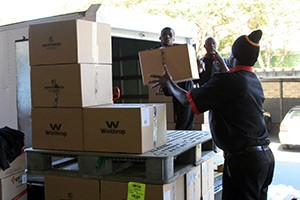- What We Do
- Agriculture and Food Security
- Democracy, Human Rights and Governance
- Economic Growth and Trade
- Education
- Ending Extreme Poverty
- Environment and Global Climate Change
- Gender Equality and Women's Empowerment
- Global Health
- Water and Sanitation
- Working in Crises and Conflict
- U.S. Global Development Lab

General Guidance
The Bureau for Global Health’s portfolio includes programs that represent the commitment and determination of the U.S. Government to prevent suffering, save lives and create a brighter future for families in the developing world. Successful implementation of U.S. Government health programs cannot function without an uninterrupted supply of quality essential health products. HIV and AIDS programs require a variety of these products. They include:
- Pharmaceuticals for HIV and other diseases
- HIV rapid diagnostic kits
- Diagnostics for measuring immune function and determining resistance patterns of tuberculosis bacteria
- Medical male circumcision kits
- Laboratory consumables
- And more!

The programs supported by the Office of HIV/AIDS are no exception and require all of these products.
Pharmaceuticals, from the point of manufacture to the point of dispensing to a patient, are vulnerable to damage which decreases their effectiveness. Morbidity and mortality, due to ineffective and substandard medications introduced into the supply chain, can be minimized with diligent screening for quality assurance at various points.
USAID’s Response
Health programs and the people they serve depend on getting the right medicines, in good condition, at the right time. With state-of-the-art regional distribution centers (RDC) operating in Ghana, Kenya and South Africa, the most frequently requested essential medicines are closer to HIV and AIDS programs than ever before. Holding stock at the RDC shortens delivery times from many months to between 2 and 4 weeks for planned orders. Programs can hold less stock on hand knowing they will receive more frequent replenishment based on their planned requirements. The RDCs follow commercial best practices to ensure security and quality of the products as well as timely delivery.
Examples of USAID Programs
Getting testing and treatment supplies from the manufacturer to the patient is not as easy as it sounds! For this reason, USAID’s Supply Chain Management System (SCMS) project, implemented by the Partnership for Supply Chain Management (PFSCM), takes a technical approach that centers on:

- Strengthening existing systems, not creating parallel or duplicate systems
- Building local capacity, empowering in-country partners to enhance and develop sustainable and appropriate responses for their own communities
- Delivering quality HIV medicines and supplies at the best value by leveraging industry best practices for planning, procurement, storage and distribution
- Promoting transparency to ensure accurate and timely supply chain information is collected, shared and used to improve decision-making
In order to assure the quality and accessibility of essential drugs, PFSCM, in collaboration with USAID, has developed a quality assurance system. Our quality assurance system is twofold: prequalification of wholesalers and manufacturers and then implementation of quality control sampling and testing procedures afterward.
With offices in 21 countries and more than 300 dedicated staff members around the world, SCMS brings together 16 private sector, non-governmental and faith-based organizations that are among the most trusted names in supply chain management and international public health and development. By working closely with partners to plan future procurements; pooling orders to buy in bulk; establishing long-term contracts with manufacturers; and purchasing generic alternatives whenever possible, SCMS and USAID help to reduce the price of essential medicines to treat HIV and AIDS and ultimately treat more patients.
Additional Resources
- New Global Health Approach to Reach Millions More People with Lifesaving Medicines
- Antiretroviral Therapy: Delivering Lifesaving HIV Treatment to Those That Need It Most
- Visit the technical guidance page for more information on approved commodities and supply chain help documents.







Comment
Make a general inquiry or suggest an improvement.